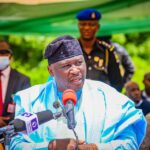
When my cousin was learning driving, we were the ride-along squad. We sat at the back while he struggled with the gears. My uncle, his father, was the one teaching. And he snapped at his son for what he thought were very silly mistakes. Now I recall that at that time my uncle had what the Heath brothers, authors of Made to Stick, called the ‘Curse of Knowledge;’ which means knowing so much about something that you forget the history of your own ignorance about the subject and expect everyone to understand at your level of expertise. “Once we know something,” Chip and Dan Heath wrote, “we find it hard to imagine what it was like not to know it. Our knowledge has “cursed” us. And it becomes difficult for us to share our knowledge with others, because we can’t readily recreate our listeners’ state of mind.”
But there was something more fundamental that I observed during the driving classes. Whenever my uncle left the car to observe his son’s performance from a distance, the son’s driving improved. He stopped hesitating, became decisive and drove smoothly – encouraged by the fact that we (left the car with him) were not there to judge or shout at him; my cousin’s driving improved because he was given (however momentary) autonomy.
Later, Daniel H. Pink wrote a book about it and titled it Drive: The Surprising Truth About What Motivates Us. He wrote the book to stress the point that human beings – in many situations – are no longer motivated by punishment and rewards, but by Motivation 3.0 which sits on the three pillars of autonomy, mastery and purpose. But one of the most important lessons I learned from that book was on autonomy, how allowing individuals to make their own decisions, make their own mistakes and self-correct, improves performance.
There is more scientific evidence that encourages us to make mistakes. “Every time a student makes a mistake in math, they grow a synapse,” says Carol Dweck who has made significant contribution to the field of psychology on how mindsets affect our performance. By this, she means, mistakes make the brain to spark and grow. Jo Boaler, in her book, Mathematical Mindsets, commented on the significance of Dweck’s statement: “Many good teachers have told students for years that mistakes are useful and they show that we are learning, but the new evidence on the brain and mistakes says something much more significant.” But where is the evidence?
A psychologist, Jason Moser, reported the results of an interesting study in 2011 of what happens in our heads when we make mistakes. Moser and his colleagues found that when we make mistakes, the brain can react in two ways. The first one is called the ERN response, which means an increase of electrical activity in the brain when it experiences some conflicts between the right response and an error. This happens whether you know that you’ve made a mistake or not. The second response is called Pe; this happens when the brain signals conscious attention to the mistake.
What does this mean? “First, the researchers found that the students’ brains reacted with greater ERN and Pe responses-electrical activity-when they made mistakes than when their answers were correct,” Jo Boaler wrote. What does that mean? The more your brain spark, the better you become at what you’re learning. And what is the point of that? Since researchers have found that the brain sparks and grows better when we make mistakes than when we get correct answers, we shouldn’t be terrified when we or our children make mistake when learning. It’s actually good. It’s a tonic for the brain.
Personally, when I was in school, there was a programming language that I found difficult to learn. I persisted and got all the books I could find from the library and from Amazon on the subject – the dummies’ guide, the idiot’s guide, the primers, etc. At a point, I left it for a while. When I came back to it, everything clicked. I reckoned my brain was sparking and growing during the earlier struggles.
However, encouraging mistakes is not only useful for learning in schools, but even businesses and governments are taking benefits from it. A good example is the city of Dubai. Sheikh Al Maktoum, the ruler of Dubai mentions this in his book, Flashes of Thought: “I might go easy on people who make mistakes, but never on people who make no effort. It is by making mistakes that a person learns. If a person falls down, he does not get up where he has fallen, but rather a few steps ahead. Similarly, a person who errs will gain knowledge and experience as a result of his error.”
Some teachers called me to speak to a group of primary school children recently. And I told the children that they should get double marks for every question they didn’t get right and one mark for correct answers. Of course the teachers didn’t agree with me. But we will get there. At least, Muslims understand that if you struggle to read the Qur’an and make mistakes, you would get double reward; one for trying and one for the mistake. So if God encourages us this way in spiritual matters, why can’t we implement that strategy in the classroom to encourage students to learn and get better?
Therefore, go into the world and make mistakes – a great deal of mistakes. Let your brain spark and grow!
 Join Daily Trust WhatsApp Community For Quick Access To News and Happenings Around You.
Join Daily Trust WhatsApp Community For Quick Access To News and Happenings Around You.


